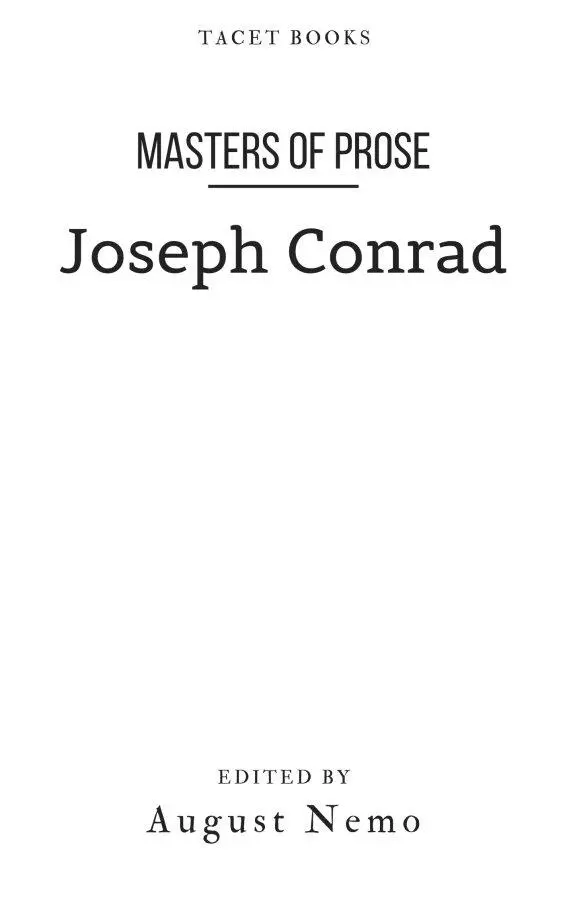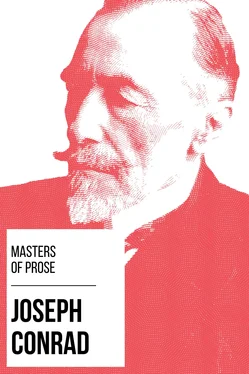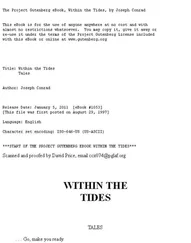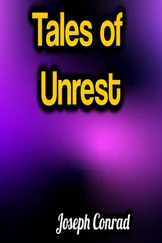
Title Page
Author
A Personal Record
Heart of Darkness
Lord Jim
Nostromo
Typhoon
The Idiots
An Outpost of Progress
Amy Foster
Youth
An Anarchist
The Secret Sharer
The Return
The Brute
Because of the Dollars
Joseph Conrad
About the Publisher


Józef Teodor Konrad Nalecz Korzeniowski (Joseph Conrad) was born to Joseph Theodore Appollonius Korzeniowski and Evelina Korzeniowski on December 3, 1857, in Berdyczew, Poland. His father was a writer and a translator of the works of William Shakespeare (1564–1616). He was also a member of a movement seeking Polish independence from Russia. In 1862 the family was forced to move to Russia because of his father's political activities. Conrad's mother died three years later in 1865. It was not until 1867 that Conrad and his father were allowed to return to Poland.
In 1868 Conrad attended high school in the Austrian province of Galicia for one year. The following year he and his father moved to Cracow, Poland, where his father died in 1869. From the time spent with his father, Conrad became a lover of literature, especially tales of the sea. After his father's death, his uncle, Thaddus Bobrowski, took Conrad in and raised him.
In June 1878 Conrad went to England for the first time. He worked as a seaman on English ships, and in 1880 he began his career as an officer in the British merchant service, rising from third mate to master. His voyages took him to distant and exotic places such as Australia, India, Singapore, Java, and Borneo, which would provide the background for much of his fiction. In 1886 he became a British citizen. He received his first command in 1888. In 1890 he traveled to the Belgian Congo, Zaire, and Africa, which inspired his great short novel The Heart of Darkness.
In the early 1890s Conrad had begun to think about writing fiction based on his experiences in the East. In 1893 he discussed his work in progress, the novel Almayer's Folly, with a passenger, the novelist John Galsworthy (1867–1933). A year later he retired from the merchant marines and completed Almayer's Folly, which was published in 1895.
It received favorable reviews and Conrad began a new career as a writer.
In 1896 he married Jessie George, an Englishwoman. Two years later, just after the birth of Borys, the first of their two sons, they settled in Kent in the south of England, where Conrad lived for the rest of his life. John Galsworthy was the first of a number of English and American writers who befriended Conrad. Others were Henry James (1843–1916), Arnold Bennett (1867–1931), Rudyard Kipling (1865–1936), Stephen Crane (1871–1900), and Ford Madox (Hueffer) Ford (1873–1939), with whom Conrad collaborated on two novels.
From 1896 through 1904 Conrad wrote novels about places he visited as a merchant marine and he explored themes such as the uncertainties of human sympathy. His early novels included An Outcast of the Islands (1896), The Nigger of the "Narcissus" (1897), The Heart of Darkness (1899), and Lord Jim (1900).
The next three novels reflected Conrad's political side. The theme of Nostromo (1904) was the relationship between man's deepest needs (his psychology) and his public actions and decisions. The description of London, England, in The Secret Agent (1907) was similar to Charles Dickens's works. It portrayed a city of mean streets and shabby lives. In Under Western Eyes (1911) Conrad examined the Russian temperament.
Conrad's next novel, Chance (1914), was a study of solitude and sympathy. Because of its financial success and the efforts of his American publisher, he was able to live without worrying about money for the rest of his life. Victory (1915), his last important novel, further examined the theme of solitude and sympathy.
Although Conrad's last novels, The Shadow Line (1917) and The Rover (1923), were written as a farewell, he received many honors. In 1923 he visited the United States to great fanfare. The year after, he declined an offer of knighthood in England.
On August 3, 1924, Conrad died of a heart attack and was buried at Canterbury, England. His gravestone bears these lines from Edmund Spenser :
"Sleep after toyle, port after stormie seas,
Ease after warre, death after life, does greatly please."


As a general rule we do not want much encouragement to talk about ourselves; yet this little book is the result of a friendly suggestion, and even of a little friendly pressure. I defended myself with some spirit; but, with characteristic tenacity, the friendly voice insisted, “You know, you really must.”
It was not an argument, but I submitted at once. If one must! . . .
You perceive the force of a word. He who wants to persuade should put his trust not in the right argument, but in the right word. The power of sound has always been greater than the power of sense. I don't say this by way of disparagement. It is better for mankind to be impressionable than reflective. Nothing humanely great—great, I mean, as affecting a whole mass of lives—has come from reflection. On the other hand, you cannot fail to see the power of mere words; such words as Glory, for instance, or Pity. I won't mention any more. They are not far to seek. Shouted with perseverance, with ardour, with conviction, these two by their sound alone have set whole nations in motion and upheaved the dry, hard ground on which rests our whole social fabric. There's “virtue” for you if you like! . . . Of course the accent must be attended to. The right accent. That's very important. The capacious lung, the thundering or the tender vocal chords. Don't talk to me of your Archimedes' lever.
He was an absent-minded person with a mathematical imagination. Mathematics commands all my respect, but I have no use for engines. Give me the right word and the right accent and I will move the world.
What a dream for a writer! Because written words have their accent, too. Yes! Let me only find the right word! Surely it must be lying somewhere among the wreckage of all the plaints and all the exultations poured out aloud since the first day when hope, the undying, came down on earth. It may be there, close by, disregarded, invisible, quite at hand. But it's no good. I believe there are men who can lay hold of a needle in a pottle of hay at the first try. For myself, I have never had such luck. And then there is that accent. Another difficulty. For who is going to tell whether the accent is right or wrong till the word is shouted, and fails to be heard, perhaps, and goes down-wind, leaving the world unmoved? Once upon a time there lived an emperor who was a sage and something of a literary man. He jotted down on ivory tablets thoughts, maxims, reflections which chance has preserved for the edification of posterity. Among other sayings—I am quoting from memory—I remember this solemn admonition: “Let all thy words have the accent of heroic truth.” The accent of heroic truth! This is very fine, but I am thinking that it is an easy matter for an austere emperor to jot down grandiose advice. Most of the working truths on this earth are humble, not heroic; and there have been times in the history of mankind when the accents of heroic truth have moved it to nothing but derision.
Читать дальше

















